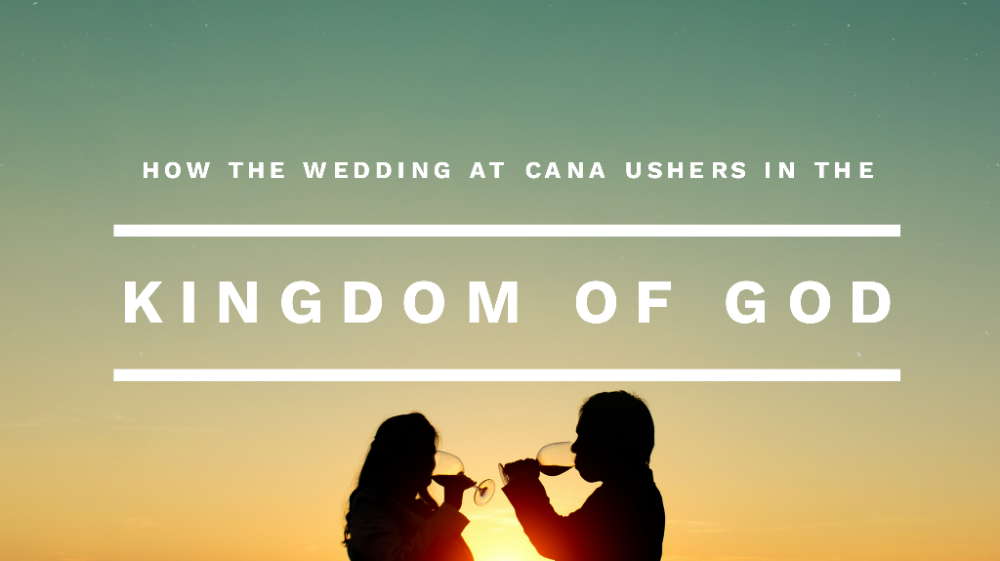WINE - How the Wedding at Cana in John 2 Ushers In the Kingdom of God
Why did Jesus turn water into wine? and what does this have to do with you sitting there 2,000 years later?
In the first half of Johns Gospel, John lays out eight stories*.
In the first half of Johns Gospel, John lays out eight stories*.
Four of these stories are to do with Jewish Institutions:
Wedding, Temple, Rabbi, Sacred Well.
Four of these stories are to do with Jewish Feasts: Sabbath,
Passover, Tabernacles, Hanukah.
In each of these stories Jesus takes these institutions and
feasts and re-orients them around himself. The stories end with Jesus at the
centre of each of them.
To understand why this happens we first have to look at the
grand sweep of Johns narrative; particularly, John’s love of the number 7, and
his love of the statement “I am”.
Number 7
Within Judaism the number 7 held particular importance.
Within the book of Genesis, the created order (including God resting) takes 7
days to complete. Due to this the number 7 came to represent “completion” or “fulfilment”.
I Am
Within Johns gospel Jesus uses the statement “I am” to refer
to Himself seven times (John 4:26, John 6:20, John 8:24, John 8:28, John 8:58,
John 13:19, John 18:5), and further uses the statements 7 times with a
predicate nominative (i.e. I am the bread of life) (John 6:35, John 8:12, John
10:7, John 10:11, John 11:25, John 14:6, John 15:1).
All this takes us back to a pivotal moment in Jewish
history: The Israelites enslaved by the Egyptians. God calls Moses to be the
person who would set them free. When Moses asks for God’s name, God replied
with the word YHWH translated as “I am who I am”, or “I am”.
When Jesus uses the phrase I am, he is really saying, I
represent God’s presence, God’s kingdom, on earth.
Let us look at this in the
context of the wedding at Cana.
The Wedding at Cana
In this story, one of the first stories in Johns gospel
(John 2:1-11), Jesus and his family attend a wedding.
Within Jewish culture, weddings would last much longer than
ours (possibly up to a week), and one of the worst things that could happen would be for them to run
out of wine! This would represent shame for the bride and groom. And in this
wedding, you guessed it, they run out of wine.
Jesus’ mother comes to Him and tells him to do something
about it.
Jesus tells the servants to take some jars, fill them with
water, and when they come back – hey presto! The water is now wine. Not only is
it wine, but it is a better quality of wine than ALL the other wine at the
wedding – the head servant cannot believe what has happened.
Wine and the Kingdom of God
Within Judaic eschatological hope, wine represented the
coming of the kingdom of God. Look at Isaiah 25:6, Amos 9:13 and Joel 3:18 to
see what I mean.
Now lets take a close look at those jars. John is quite
descriptive about the jars. The total quantity of wine that those jars could
hold was between 120-180 GALLONS!!! (about 680 Litres) What an excessive amount
of wine! More wine than any wedding party could drink.
So why did Jesus produce such a large quantity of wine?
For this answer let us look at another story within John’s
gospel that has obvious parallels, the feeding of the five thousand in John
6:1-14. Within this story Jesus feeds five thousand men (and all the
accompanying women and children) with only 5 loaves of bread and 2 fish. Not
only does he manage to feed all of these people, but there are 12 baskets of
food left over!!! Again, such an excessive quantity. He created more food than
all of those people could eat!
What is Jesus trying to say through this?
That the Kingdom of God is coming, and that it is marked by
an extravagance; and abundance.
Jesus uses an illustration about wine, and an illustration
about bread to describe what the coming kingdom will be like.
Wine and Bread
Wine and bread take us to the last supper. Jesus uses these
two symbols to represent his coming death; his sacrifice. Interestingly John
doesn’t have a bread and wine scene at the last supper in his gospel, instead
this part of the last supper is foreshadowed by these two stories.
To recap. The Kingdom of God is coming. It is marked by
extravagance. And it is ushered in through the death and resurrection of Jesus.
Back to those jars.
The jars that Jesus used weren’t just any jars.
Specifically, they were stone jars used in Jewish purification rituals. It was
the water from these jars that people used to purify themselves from any ritual
uncleanliness. Stone, as opposed to earthenware could never be defiled.
The kingdom of God is coming, it is marked by extravagance,
and it is ushered in through the death and resurrection of Jesus acting as a
purification of humanity.
Now and Not Yet of the Kingdom
One of primary questions that we are called to look at is:
if Christ ushered in the Kingdom of God, then why is the world so very messed
up?
The answer is that the kingdom is now and not yet. The
Kingdom of God reigns within us through the presence of the Holy Spirit in our
lives. The Spirit acts to continually purify and prepare us for the kingdom. We
in turn are to do the same thing for the rest of the world.
We as the Church are called to be the signpost to what the
Kingdom of God looks like on earth; a kingdom marked by an extravagance of
love.
May we fully realise the extravagance of God’s kingdom. May
we learn to fully appreciate the significance of what Jesus has done for us.
And may we, just like Jesus, usher in the Kingdom of God through our words,
thoughts, and deeds.
How have you experienced the extravagance of God's kingdom in your life? Leave a comment below.
*The inspiration for this series comes from the bible projects' video on John's gospel. The majority of research I am using is taken from The New Interpreter's Bible - Luke & John (affiliate link).
How have you experienced the extravagance of God's kingdom in your life? Leave a comment below.
*The inspiration for this series comes from the bible projects' video on John's gospel. The majority of research I am using is taken from The New Interpreter's Bible - Luke & John (affiliate link).





Comments
Post a Comment